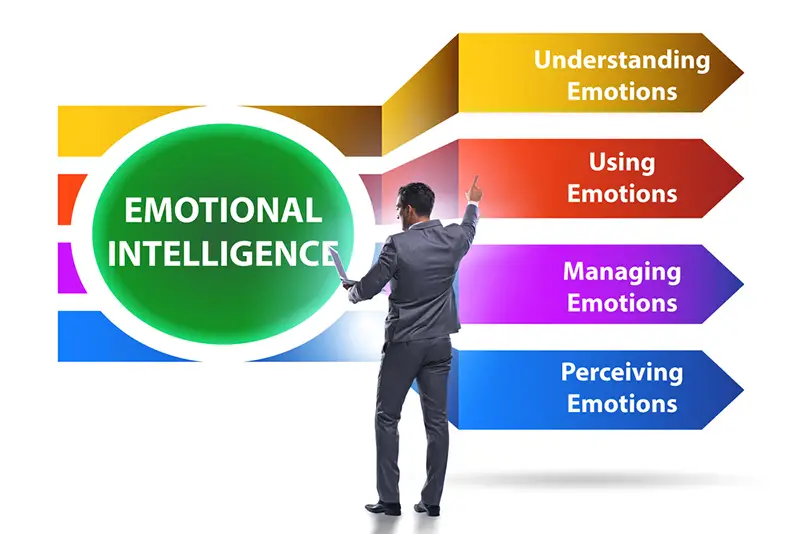
The success of any marketing campaign lies in its ability to connect with the target audience on an emotional level. After all, human beings are emotional creatures who make decisions based on their feelings. In today’s saturated market, where consumers are bombarded with a constant stream of advertisements and promotions, the need to stand out and make a lasting impact has never been greater. This is where emotional intelligence in marketing comes into play.
Emotional intelligence, often referred to as EQ, is the ability to recognise and understand one’s own emotions, as well as those of others. It involves being attuned to the needs, desires, and pain points of the target audience and using this knowledge to create marketing content that resonates with them on a deep and personal level. In other words, it is the art of crafting emotionally intelligent marketing content.
Gone are the days when marketers could simply rely on catchy slogans and jingles to capture the attention of their target audience. Today’s consumers crave authentic and meaningful connections with the brands they choose to support. They want to feel understood, valued, and appreciated, and they are more likely to engage with and remain loyal to brands that are able to deliver on these emotional needs.
But how exactly does emotional intelligence play a role in marketing? The answer lies in understanding the psychology of emotions and leveraging this knowledge to create content that evokes specific emotional responses. By tapping into the power of emotions, marketers can create a bond between the brand and the consumer that goes beyond a transactional relationship.
Whether it’s using storytelling techniques to engage and captivate the audience or incorporating elements of surprise and delight to spark positive emotions, emotional intelligence allows marketers to create content that resonates on a deep and personal level. It enables them to anticipate the needs and desires of the target audience and tailor their messaging and branding accordingly.
But emotional intelligence in marketing goes beyond just the content itself. It also extends to the way marketers interact with their audience, both online and offline. It involves empathising with the customer, actively listening to their feedback, and responding in a timely and respectful manner. It entails creating a positive and inclusive brand culture that fosters emotional connections with employees and customers alike.
Examples of Emotional Intelligence in Marketing Content
1. Nike’s “Dream Crazy” Campaign:
Nike’s “Dream Crazy” campaign is a powerful example of emotionally intelligent marketing content. By featuring Colin Kaepernick, the controversial NFL player who took a knee during the national anthem to protest racial injustice, Nike tapped into the emotions of its audience. The campaign ignited a fierce debate and sparked strong emotional reactions from people on both sides of the argument. By aligning their brand with a social cause, Nike demonstrated emotional intelligence, connecting with consumers who shared the same values and beliefs.
2. Dove’s “Real Beauty” Campaign:
Dove’s “Real Beauty” campaign is another prime example of emotionally intelligent marketing. This campaign aimed to challenge societies’ definitions of beauty by featuring real women of different shapes, sizes, and colors. By promoting inclusivity and self-acceptance, Dove struck a chord with women who had long been bombarded with unrealistic beauty standards. The emotionally charged content not only resonated with the target audience but also positioned the brand as one that cared about the well-being and self-esteem of women.
3. Coca-Cola’s “Share a Coke” Campaign:
Coca-Cola’s “Share a Coke” campaign is a fantastic illustration of emotional intelligence in marketing. By personalising their product through customised labels with popular names, Coca-Cola created a sense of belonging and connection. This campaign triggered positive emotions associated with nostalgia, friendship, and sharing. People were not just buying a bottle of soda; they were embracing an experience and a chance to connect with others on a personal level. By tapping into the inherent desire for connection and human relationships, Coca-Cola was able to create a lasting emotional bond with its consumers.
4. Google’s “Dear Sophie” Ad:
Google’s “Dear Sophie” ad is an emotionally intelligent masterpiece. This heartfelt commercial aimed to promote Google’s “Chrome” browser but achieved much more than that. The ad tells the story of a father using technology to document his daughter’s life, showcasing emotional moments such as her first steps, birthday parties, and school performances. By highlighting the universal emotions of love, nostalgia, and the desire to cherish memories, Google touched the hearts of viewers. The emotional connection established in the ad not only enhanced brand perception but also emphasised the role technology plays in strengthening interpersonal relationships.
5. Airbnb’s “Belong Anywhere” Campaign:
Airbnb’s “Belong Anywhere” campaign epitomises emotional intelligence in marketing content. This campaign aimed to promote the idea that when you travel, you can find a sense of belonging wherever you go. By highlighting personal stories and experiences of individuals who used Airbnb, the campaign sought to evoke emotions of adventure, discovery, and connection. By leveraging the desire for authentic experiences, Airbnb established an emotional connection with potential travellers, transforming their brand from a mere accommodation platform to a gateway to unforgettable moments.
In an era where consumers are becoming increasingly discerning and demanding, emotional intelligence in marketing is no longer just a nice-to-have; it is a must-have. By harnessing the power of emotions, marketers can create a lasting impact that goes far beyond just making a sale. They can build a strong and loyal customer base that believes in and advocates for their brand. So, it’s time to embrace the art of crafting emotionally intelligent marketing content and unlock the true potential of your brand.
You may also like: How To Build A Successful Digital Marketing Campaign
Image source: Depositphotos.com

Generating leads is a crucial...

Welcome to the Future of...

It is evident that social...